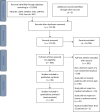Long-term and serious harms of medical cannabis and cannabinoids for chronic pain: a systematic review of non-randomised studies
- PMID: 35926992
- PMCID: PMC9358949
- DOI: 10.1136/bmjopen-2021-054282
Long-term and serious harms of medical cannabis and cannabinoids for chronic pain: a systematic review of non-randomised studies
Abstract
Objective: To establish the prevalence of long-term and serious harms of medical cannabis for chronic pain.
Design: Systematic review and meta-analysis.
Data sources: MEDLINE, EMBASE, PsycINFO and CENTRAL from inception to 1 April 2020.
Study selection: Non-randomised studies reporting on harms of medical cannabis or cannabinoids in adults or children living with chronic pain with ≥4 weeks of follow-up.
Data extraction and synthesis: A parallel guideline panel provided input on the design and interpretation of the systematic review, including selection of adverse events for consideration. Two reviewers, working independently and in duplicate, screened the search results, extracted data and assessed risk of bias. We used random-effects models for all meta-analyses and the Grades of Recommendations, Assessment, Development and Evaluation approach to evaluate the certainty of evidence.
Results: We identified 39 eligible studies that enrolled 12 143 adult patients with chronic pain. Very low certainty evidence suggests that adverse events are common (prevalence: 26.0%; 95% CI 13.2% to 41.2%) among users of medical cannabis for chronic pain, particularly any psychiatric adverse events (prevalence: 13.5%; 95% CI 2.6% to 30.6%). Very low certainty evidence, however, indicates serious adverse events, adverse events leading to discontinuation, cognitive adverse events, accidents and injuries, and dependence and withdrawal syndrome are less common and each typically occur in fewer than 1 in 20 patients. We compared studies with <24 weeks and ≥24 weeks of cannabis use and found more adverse events reported among studies with longer follow-up (test for interaction p<0.01). Palmitoylethanolamide was usually associated with few to no adverse events. We found insufficient evidence addressing the harms of medical cannabis compared with other pain management options, such as opioids.
Conclusions: There is very low certainty evidence that adverse events are common among people living with chronic pain who use medical cannabis or cannabinoids, but that few patients experience serious adverse events.
Keywords: PAIN MANAGEMENT; PRIMARY CARE; Pain management.
© Author(s) (or their employer(s)) 2022. Re-use permitted under CC BY-NC. No commercial re-use. See rights and permissions. Published by BMJ.
Conflict of interest statement
Competing interests: None declared.
Figures
References
-
- Mills SEE, van Hecke O, Smith BH. Handbook of pain and palliative care: biopsychosocial and environmental approaches for the life course, 2019.
-
- National Academies of Sciences E, Medicine, Health . The National Academies Collection: Reports funded by National Institutes of Health. In: The health effects of cannabis and cannabinoids: the current state of evidence and recommendations for research. Washington (DC): National Academies Press (US), 2017. - PubMed
Publication types
MeSH terms
Substances
LinkOut - more resources
Full Text Sources
Medical
Miscellaneous


